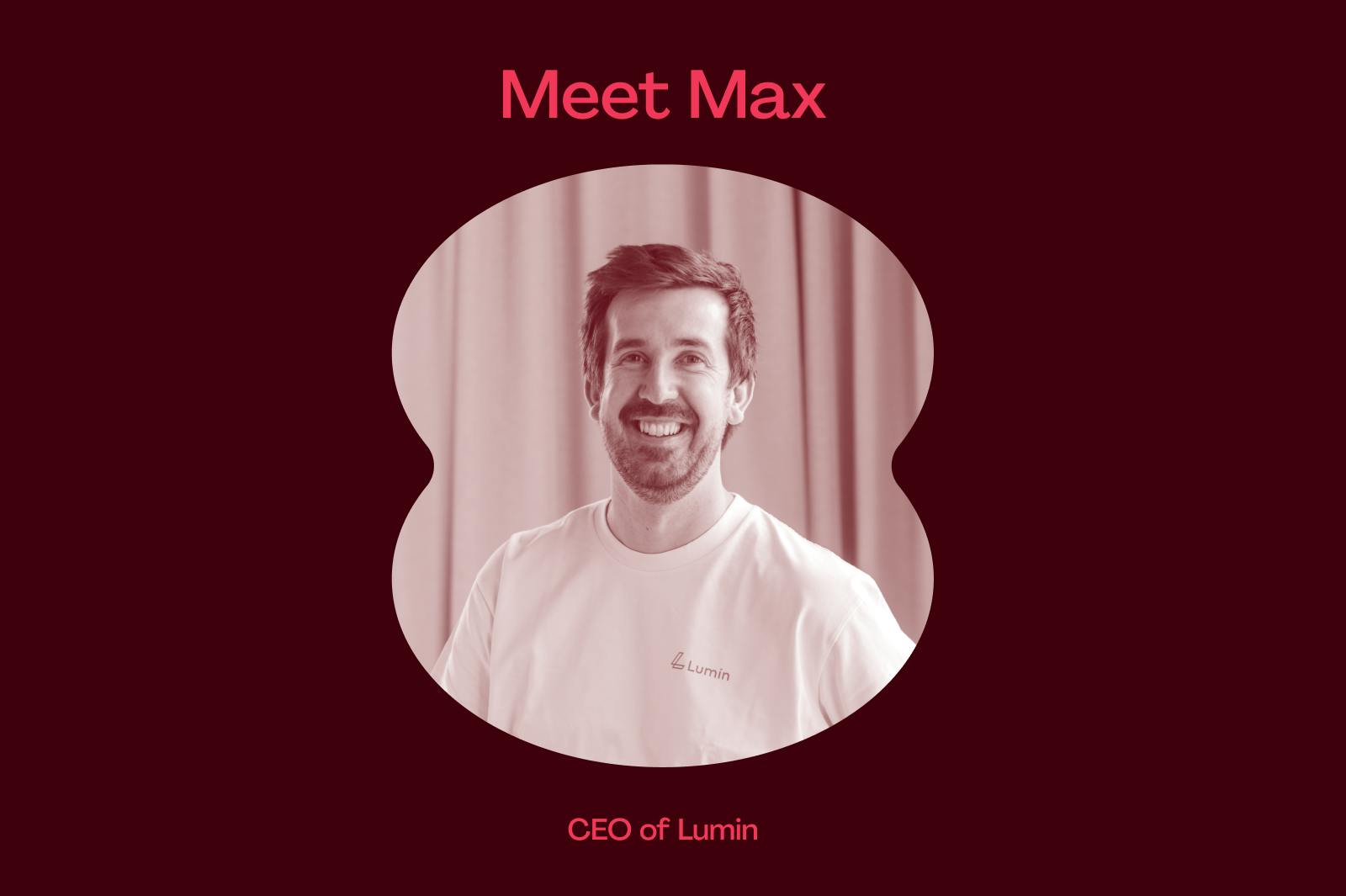Get to know: Max Ferguson, CEO and founder
author
Lumin staff
published
Apr 1, 2024
categories
Culture
read time
4 mins

Get to know Max Ferguson, Lumin’s frustration-driven founder and CEO. He gives us a guide on how to lead with vision, and what tech leadership looks like in 2024.
Table of Contents
1. Quickfire questions:
- 1. Quickfire questions:
share this post
There is a storm inside Max Ferguson. It pelts his brain with constant drizzle and chance lightning. On his surface, all is calm.
The storm is paperwork. With every problem paperwork causes a new, solution-bearing neuron is pushed into his pre-frontal cortex. Together these solutions form a super-solver: Lumin.
Every tech leader has a calling: Max’s is to make work frictionless. How does he do it? We sat down to talk about leading a team with bold ambitions.
How does frustration drive you?
There is always a tendency in tech for things to get a bit stale or overpriced. People are not necessarily putting their best foot forward or improving.
That is why I started Lumin in the first place; I could not see a good way to work with documents at a construction site. There are heaps of companies out there that were capable of doing it, but they weren’t doing it, and that frustrated me at a personal level.
If Lumin is becoming outdated, let’s redesign it to ensure we are delivering the best thing for the customer; not let it sit there and rake in money for years and let it go bad. We’re doing that now; reimagining how our core products work.
Who do you look up to in terms of vision?
Probably Google. If you look over what they have done in the last 20 years, their products always feel modern and always work. They are backed by massive ad revenue, so there is the money to do it, but they have continued to innovate and deliver on their vision. When web browsers stopped improving, they rolled out Chrome. When iOS monopolized the mobile phone market, Google bought Android and levelled the playing field.
Would you always have ended up in the tech industry?
I need to be somewhere where I can change stuff; I get frustrated by the status quo in general, regardless of industry. And tech is a natural space for that.
At its core, tech is an industry where people are trying to change the status quo. It is quite broad. So, yes, I would always have ended up here. It could have been fintech, it could have been medtech – but I never liked biology too much.
Do you think most founders share that urge to break the status quo?
I think the ones who have been successful with one company over a long period of time are driven by it, yes. The founders here in Christchurch who have been here through the pandemic all have that drive.
But not every founder is like that. Some are just straight up out there to sell stuff and get rich; There’s nothing wrong with that, but it’s a different motivation. You can tell by the pattern of their careers – they’ll move from one lucrative area to the next with no clear direction.
How much does creativity drive your vision?
I was never good at art, so disrupting the status quo is my form of creativity. Often fields can stagnate and get monopolistic, and one company will float to the top and once they’re there they lose motivation, ambition, interest, creativity – all those exciting things.
If [the business] becomes purely about maximizing profit – where is the excitement in that? Where is the creativity?
Is that why we came out with so many new products and features last year?
Yes! And in a year when everyone else was backing off their investments. Making a profit is one of my responsibilities as CEO, but I also think creating an interesting work environment and delivering great products is important. I want to make profit by doing that.
What informs your leadership decisions?
Open discussion documents are important, as they feed into what we are seeing. But at the end of the day somebody needs to make a decision. So I spend a lot of time listening to everyone internally, listening to a lot of customers, and then think: all right, we are going this way because of x. Is it the right decision? We can’t know. We make decisions that makes sense with the context we have.
Quickfire questions:
I'm watching: Mad Men
I'm listening to: Nora En Pure – Emerald Skies. On my platform of choice: YouTube Music.
I'm reading: Google’s Quality Rater guidelines – I am curious how Google is going to deal with AI spam.
My 2024 professional goal is: I want to see Lumin Sign become one of the mainstream eSignature contenders and solve the editable PDF problem; it still feels like quite a hacked-together process.
Linkedin: Let's connect!
share this post